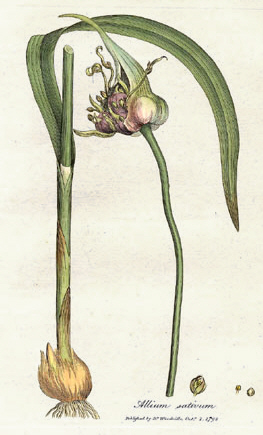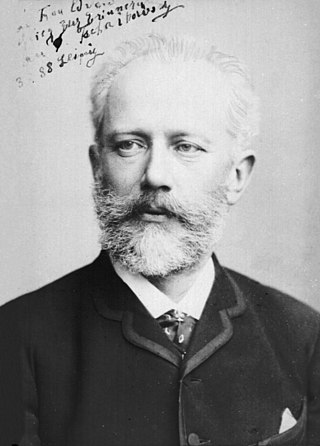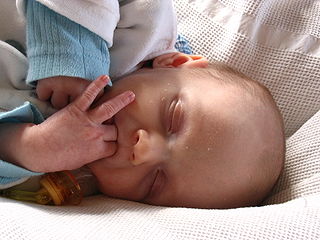Related Research Articles

Garlic is a species of bulbous flowering plant in the genus Allium. Its close relatives include the onion, shallot, leek, chive, Welsh onion, and Chinese onion. It is native to South Asia, Central Asia and northeastern Iran and has long been used as a seasoning worldwide, with a history of several thousand years of human consumption and use. It was known to ancient Egyptians and has been used as both a food flavoring and a traditional medicine. China produced 73% of the world's supply of garlic in 2021.

Lilium is a genus of herbaceous flowering plants growing from bulbs, all with large prominent flowers. They are the true lilies. Lilies are a group of flowering plants which are important in culture and literature in much of the world. Most species are native to the Northern Hemisphere and their range is temperate climates and extends into the subtropics. Many other plants have "lily" in their common names, but do not belong to the same genus and are therefore not true lilies.

Ventriloquism is an act of stagecraft in which a person speaks in such a way that it looks like their voice is coming from a different location, usually through a puppet known as a "dummy". The act of ventriloquism is ventriloquizing, and the ability to do so is commonly called in English the ability to "throw" one's voice.

Narcissus is a genus of predominantly spring flowering perennial plants of the amaryllis family, Amaryllidaceae. Various common names including daffodil, narcissus and jonquil, are used to describe all or some members of the genus. Narcissus has conspicuous flowers with six petal-like tepals surmounted by a cup- or trumpet-shaped corona. The flowers are generally white and yellow, with either uniform or contrasting coloured tepals and corona.

The Nutcracker, Op. 71, is an 1892 two-act classical ballet by Pyotr Ilyich Tchaikovsky, set on Christmas Eve at the foot of a Christmas tree in a child's imagination. The plot is an adaptation of E. T. A. Hoffmann's 1816 short story The Nutcracker and the Mouse King. The ballet's first choreographer was Marius Petipa, with whom Tchaikovsky had worked three years earlier on The Sleeping Beauty, assisted by Lev Ivanov. Although the complete and staged The Nutcracker ballet was not as successful as had been the 20-minute Nutcracker Suite that Tchaikovsky had premiered nine months earlier, The Nutcracker soon became popular.

A pacifier is a rubber, plastic, or silicone nipple substitute given to an infant or toddler to suckle upon between feedings to quiet its distress by satisfying the need to suck when it does not need to eat. Pacifiers normally have three parts: an elongated teat, a handle, and a mouth shield which prevents the child from swallowing or choking on it.

Congenital syphilis is syphilis that occurs when a mother with untreated syphilis passes the infection to her baby during pregnancy or at birth. It may present in the fetus, infant, or later. Clinical features vary and differ between early onset, that is presentation before 2-years of age, and late onset, presentation after age 2-years. Infection in the unborn baby may present as poor growth, non-immune hydrops leading to premature birth or loss of the baby, or no signs. Affected newborns mostly initially have no clinical signs. They may be small and irritable. Characteristic features include a rash, fever, large liver and spleen, a runny and congested nose, and inflammation around bone or cartilage. There may be jaundice, large glands, pneumonia, meningitis, warty bumps on genitals, deafness or blindness. Untreated babies that survive the early phase may develop skeletal deformities including deformity of the nose, lower legs, forehead, collar bone, jaw, and cheek bone. There may be a perforated or high arched palate, and recurrent joint disease. Other late signs include linear perioral tears, intellectual disability, hydrocephalus, and juvenile general paresis. Seizures and cranial nerve palsies may first occur in both early and late phases. Eighth nerve palsy, interstitial keratitis and small notched teeth may appear individually or together; known as Hutchinson's triad.

A gag is a device used in sexual bondage and BDSM roleplay. Gags are usually associated with roleplays involving bondage, but that is not necessarily the case. The person who wears the gag is regarded as the submissive partner, while the other is regarded as the dominant one. People may wear gags for a variety of reasons. Some people derive erotic pleasure from a gag, either in a submissive or dominant role. When combined with other physical restraints, the wearing of a gag can increase the wearer's sense of helplessness and anxiety level within a BDSM scene by rendering them unable to speak during sexual activity, which some people enjoy.
A layette is a collection of clothing and accessories for a newborn child. The term "layette set" is commonly used in the United States to refer to sets of baby clothes. In the 1920s, expectant mothers or their friends and relatives frequently knitted a matching layette set, consisting of a blanket, hat, sweater and booties. Expectant parents today are more likely to purchase pre-curated layette sets from brands.

Thumb sucking is a behavior found in humans, chimpanzees, captive ring-tailed lemurs, and other primates. It usually involves placing the thumb into the mouth and rhythmically repeating sucking contact for a prolonged duration. It can also be accomplished with any organ within reach and is considered to be soothing and therapeutic for the person. As a child develops the habit, it will usually develop a "favourite" finger to suck on.

Calochortus nuttallii, also known as the sego lily, is a bulbous perennial plant that is endemic to the Western United States. The common name of sego comes from a similar Shoshone word. It is the state flower of Utah.

Breastfeeding difficulties refers to problems that arise from breastfeeding, the feeding of an infant or young child with milk from a woman's breasts. Although babies have a sucking reflex that enables them to suck and swallow milk, and human breast milk is usually the best source of nourishment for human infants, there are circumstances under which breastfeeding can be problematic, or even in rare instances, contraindicated.
Zapf Creation is a toy company based near Coburg, Germany which specialises in the manufacture of multi-functional baby dolls. Its franchises have become very popular around the world; among its successful creations are Maggie Raggies, Baby Born, Baby Annabell, and Chou Chou.

Breastfeeding, or nursing, is the process by which human breast milk is fed to a child. Breast milk may be from the breast, or may be pumped and fed to the infant. The World Health Organization (WHO) recommends that breastfeeding begin within the first hour of a baby's life and continue as often and as much as the baby wants. Health organizations, including the WHO, recommend breastfeeding exclusively for six months. This means that no other foods or drinks, other than vitamin D, are typically given. The WHO recommends exclusive breastfeeding for the first 6 months of life, followed by continued breastfeeding with appropriate complementary foods for up to 2 years and beyond. Of the 135 million babies born every year, only 42% are breastfed within the first hour of life, only 38% of mothers practice exclusive breastfeeding during the first six months, and 58% of mothers continue breastfeeding up to the age of two years and beyond.

Tulips are spring-blooming perennial herbaceous bulbiferous geophytes in the Tulipa genus. Their flowers are usually large, showy, and brightly coloured, generally red, orange, pink, yellow, or white. They often have a different coloured blotch at the base of the tepals, internally. Because of a degree of variability within the populations and a long history of cultivation, classification has been complex and controversial. The tulip is a member of the lily family, Liliaceae, along with 14 other genera, where it is most closely related to Amana, Erythronium, and Gagea in the tribe Lilieae.
Tsarist autocracy, also called Tsarism, was an autocracy, a form of absolute monarchy localised with the Grand Duchy of Moscow and its successor states, the Tsardom of Russia and the Russian Empire. In it, the Tsar possessed in principle authority and wealth, with more power than constitutional monarchs counterbalanced by legislative authority, as well as a more religious authority than Western monarchs. The institution originated during the time of Ivan III (1462−1505) and was abolished after the Russian Revolution of 1917.

A puppet is an object, often resembling a human, animal or mythical figure, that is animated or manipulated by a person called a puppeteer. Puppetry is an ancient form of theatre which dates back to the 5th century BC in Ancient Greece.
Infant feeding is the practice of feeding infants. Breast milk provides the best nutrition when compared to infant formula. Infants are usually introduced to solid foods at around four to six months of age.
Steaming or artificial humidity was the process of injecting steam from boilers into cotton weaving sheds in Lancashire, England, in the late 19th and early 20th centuries. The intention was to prevent breakages in short-staple Indian Surat cotton which was introduced in 1862 during a blockade of American cotton at the time of the American Civil War. There was considerable concern about the health implications of steaming. Believed to cause ill health, this practice became the subject of much campaigning and investigation from the 1880s to the 1920s. A number of Acts of Parliament imposed modifications.

Maggie Simpson in "The Force Awakens from Its Nap" is an animated short film based on the television series The Simpsons. The short was released on May 4, 2021, on Disney+ in celebration of Star Wars Day.
References
- ↑ David Ransel "Village Mothers: three generations of change in Russia and Tataria", 28-29
- ↑ Gale, Catharine R.; Martyn, Christopher N. (1995). "Dummies and the Health of Hertfordshire Infants, 1911–1930". Social History of Medicine. 8 (2): 231–255. doi:10.1093/shm/8.2.231. PMID 11639807.